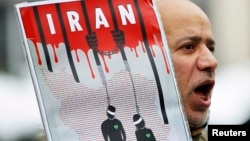GENEVA —
The U.N. Human Rights Office says it is alarmed at the reported spike in executions in Iran since the beginning of the year. The office says at least 80 people have been executed, but some reports put that figure as high as 95.
The U.N. agency says most executions in Iran are for drug-related offenses. Spokeswoman Ravina Shamdasani says these crimes are non-lethal and, as such, do not meet the international law standard of “most serious crimes,” for which the death penalty can be applied.
“We have repeatedly made our concerns known to the government, privately and in public, and there were some encouraging signs last year where political prisoners were released, etc. So, we were hoping and we were encouraged by these signs, but it appears, at least in the past seven weeks that in fact executions have been scaled up," she said.
Shamdasani says a number of people have been executed in secret and at least seven people in public this year. The most common method of execution is by hanging. She says the U.N. Human Rights office is particularly concerned about the reported execution in secret last month of two members of the minority Ahwaz Arab community.
She says the two men, Hadi Rashedi and Hashem Sha’bani, did not have a fair trial as stipulated under international law. She says they reportedly were denied access to a lawyer and their families for the first nine months of their detention. She says they allegedly had been tortured to force them to confess.
Shamdasani tells VOA the two men were sentenced to death on charges of “enmity against God,” corruption on earth, and acts against national security.
“The problem with this charge of “enmity against God” is that it is so ill-defined and so broad that it can be applied to a whole host of offenses," she said. "I am sure blasphemy would fall within that as well. But, it can be applied to a whole host of other offenses as well. And, this is why it is particularly problematic…The fact that they have been executed raises serious questions, in addition to the questions that we usually have about application of the death penalty in Iran on drug offenses, on offenses that do not meet the high threshold - the fact that they hail from this minority group and that they worked for cultural organizations is further cause for concern.”
The U.N. office reports at least 500 people were executed in 2013, including 57 in public. However, some sources think that figure may be as high as 625. It says among those executed were political prisoners, members of ethnic minority groups, and 28 women.
U.N. human rights advocates are urging Teheran to immediately halt executions and to establish a moratorium on the death penalty.
The U.N. agency says most executions in Iran are for drug-related offenses. Spokeswoman Ravina Shamdasani says these crimes are non-lethal and, as such, do not meet the international law standard of “most serious crimes,” for which the death penalty can be applied.
“We have repeatedly made our concerns known to the government, privately and in public, and there were some encouraging signs last year where political prisoners were released, etc. So, we were hoping and we were encouraged by these signs, but it appears, at least in the past seven weeks that in fact executions have been scaled up," she said.
Shamdasani says a number of people have been executed in secret and at least seven people in public this year. The most common method of execution is by hanging. She says the U.N. Human Rights office is particularly concerned about the reported execution in secret last month of two members of the minority Ahwaz Arab community.
She says the two men, Hadi Rashedi and Hashem Sha’bani, did not have a fair trial as stipulated under international law. She says they reportedly were denied access to a lawyer and their families for the first nine months of their detention. She says they allegedly had been tortured to force them to confess.
Shamdasani tells VOA the two men were sentenced to death on charges of “enmity against God,” corruption on earth, and acts against national security.
“The problem with this charge of “enmity against God” is that it is so ill-defined and so broad that it can be applied to a whole host of offenses," she said. "I am sure blasphemy would fall within that as well. But, it can be applied to a whole host of other offenses as well. And, this is why it is particularly problematic…The fact that they have been executed raises serious questions, in addition to the questions that we usually have about application of the death penalty in Iran on drug offenses, on offenses that do not meet the high threshold - the fact that they hail from this minority group and that they worked for cultural organizations is further cause for concern.”
The U.N. office reports at least 500 people were executed in 2013, including 57 in public. However, some sources think that figure may be as high as 625. It says among those executed were political prisoners, members of ethnic minority groups, and 28 women.
U.N. human rights advocates are urging Teheran to immediately halt executions and to establish a moratorium on the death penalty.










